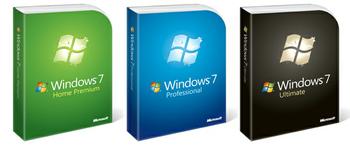The multiple editions of Windows 7
Following the 2001 introduction of Windows XP - available in Home or Professional editions - Microsoft has made its core operating systems available in a baffling number of flavours. Windows XP, originally available in two forms, later expanded to six with the launch of a 64-bit edition, a Tablet PC edition, a Media Center edition and a Starter edition.
Continuing the trend, Windows Vista arrived in 2007 in no-less than six unique flavours; Windows Vista Starter; Windows Vista Home Basic; Windows Vista Home Premium; Windows Vista Business; Windows Vista Enterprise; and Windows Vista Ultimate. Microsoft's decision to release multiple versions of Vista has often left the company open to ridicule, with arch-rival Apple going as far as to launch a "choose a Vista" ad campaign in which it highlights that its own software - Mac OS X - comes in one single version.
Given the bad press associated with Vista, one could easily have assumed that Windows 7 would become available in just one, or perhaps two, different versions. Going against the theory of a simplified user experience, Microsoft put an end to any such assumptions early in 2009 when it confirmed that 7, like Vista, would launch in six unique product editions.
As expected, media were quick to criticise the software giant, with some suggesting that 7 would be Vista all over again. Once the dust settled, however, it became apparent that the multiple editions of Windows 7 actually make a whole lot more sense. Here's how the six 7's stack up:
- Windows 7 Starter (32-bit only)
The Starter edition of Windows 7 will be made available to OEMs only. For the consumer, that means Windows 7 Starter won’t be available as a standalone software product on store shelves – instead, it’ll be available to system integrators and computer manufacturers for pre-installation on low-end systems such as netbooks.
- Windows 7 Home Basic (32-bit or 64-bit)
Unlike Windows Vista, the Home Basic edition of Windows 7 will be available only in emerging markets such as India, Brazil and China.
- Windows 7 Home Premium (32-bit or 64-bit)
This is the edition that Microsoft will be targeting at the everyday home user – expect to see this one occupying the most room on store shelves.
- Windows 7 Professional (32-bit or 64-bit)
The Professional edition targets the small-business user and, as with Home Premium, it’ll be available through the usual retail channels.
- Windows 7 Enterprise (32-bit or 64-bit)
Aimed at the enterprise market, this edition will be available only through volume licensing.
- Windows 7 Ultimate (32-bit or 64-bit)
In terms of features, Windows 7 Ultimate is identical to Windows 7 Enterprise, but it’ll be available to home users on an individual license basis.
Taking the above information into consideration, we can ascertain that only three editions will be made available to consumers via retail stores. In our estimation, that's still at least one too many, but UK consumers planning on purchasing Windows 7 are faced with a relatively straightforward choice between; Windows 7 Home Premium, Windows 7 Professional or Windows 7 Ultimate.
Unlike Vista, however, what's truly useful to 7's product editions is that each is a superset of the one before it. Therefore, all the features in Windows 7 Home Premium will be present in Windows 7 Professional, and so forth. Bizarrely, that wasn't the case with Vista.
Here's a brief look at the key features available to each edition of Windows 7:
| Edition | Availability |
Key features |
UK retail price | |
|---|---|---|---|---|
| Upgrade | Full | |||
Windows 7 Starter |
OEM only |
Windows Media Player, Backup and Restore, Action Centre, Enhanced Taskbar, Device Stage |
N/A | N/A |
Windows 7 Home Basic |
Emerging |
As above, plus changeable desktop wallpaper, fast user switching, Windows Mobility Center, support for multiple monitors |
N/A | N/A |
Windows 7 Home Premium |
Retail and OEM |
As above, plus Windows Aero, Multi-touch support, Home Group, Windows Media Center and Remote Media Player, |
£79.99 | £149.99 |
Windows 7 Professional |
Retail and OEM |
As above, plus Offline Folders, Remote Desktop, Domain Join, Encrypting File System, Presentation Mode and Windows XP mode |
£189.99 | £219.99 |
Windows 7 Enterprise |
Enterprise (volume licensing) |
As above, plus BitLocker, AppLocker, Direct Access, Branche Cache, volume-licensing |
N/A | N/A |
Windows 7 Ultimate |
Retail and OEM |
As above, minus volume licensing |
£199.99 | £229.99 |
It's all starting to look a whole lot clearer, and Windows 7 Home Premium is the obvious choice for home users, whilst Windows 7 Professional caters for the business user. Consumers should also be aware, however, that five of the six product editions are available in 32-bit or 64-bit variants. As we alluded to earlier in the article, Microsoft continues to offer 32-bit versions of its software for systems equipped with 32-bit-only hardware.
However, with driver problems relating to 64-bit software becoming a thing of the past, and the 4GB memory limitation of a 32-bit Windows operating system, there's little reason not to purchase and run a 64-bit version of Windows 7.
Choosing a product edition, then, isn't quite as easy as it should be - although it is a marked improvement when compared to Vista. But what about the upgrade process for users migrating to 7 from an older version of Windows?



